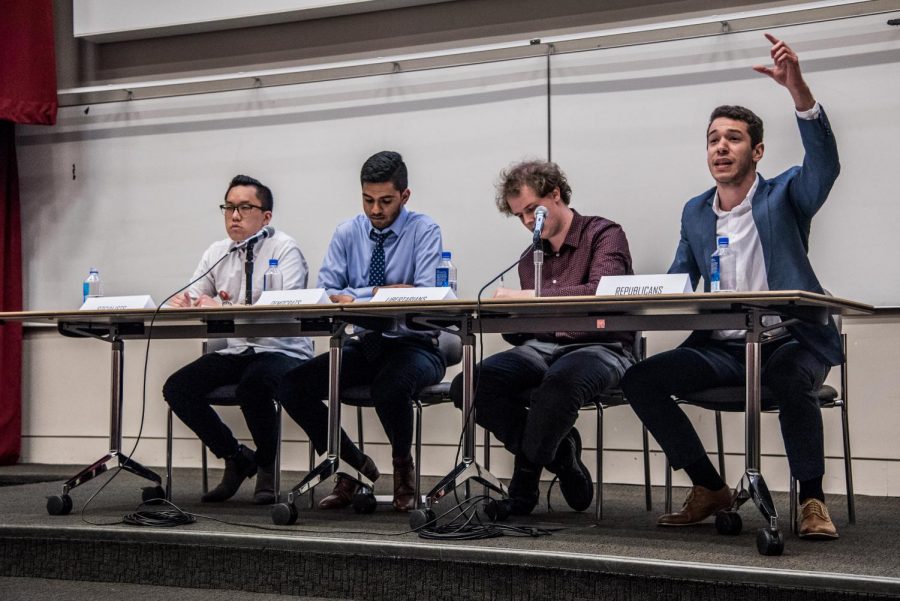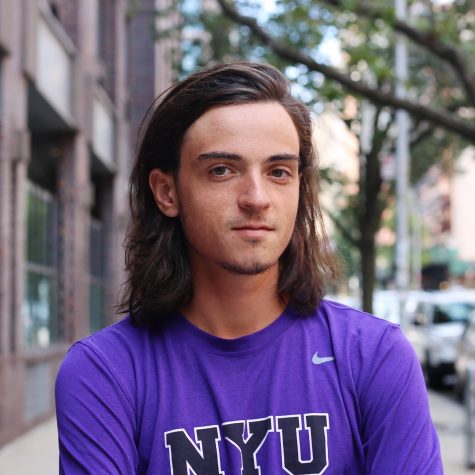Campus Political Clubs Engage in Heated Debate on Internet Privacy, Tariffs
NYU DSA, College Democrats, College Libertarians and College Republicans at their semesterly interclub debate on April 18. The groups debated internet privacy and tariffs, and the back-and-forth grew more contentious as the evening progressed.
April 20, 2018
On Wednesday, NYU Politics Society hosted an Inter-club Debate between the College Democrats, College Libertarians, College Republicans and NYU Democratic Socialists of America to discuss internet privacy and international tariffs.
In light of the recent Cambridge Analytica scandal and Mark Zuckerberg’s testimony before Congress, there has been marked debate throughout the country on how to protect users’ online data.
The first half of the debate set to discuss this question, with CAS graduate student Daniel Cheng debating for the DSA, Stern junior Anand Balaji for the NYUCD, CAS senior Weston Richey for the NYUCL and CAS senior Sebastian Jimenez Bienen for the NYUCR. When each gave their opening remarks, there was audible support for the NYUCR representative, whose club filled about half of the audience.
In their opening statements, the Socialists and Democrats agreed that internet privacy should be regulated by the government, while the Republican and Libertarian debaters said that the responsibility belongs to companies and those who choose to use the platforms.
“The responsibility to protect people’s data is beared by companies. If consumers don’t like what companies are doing with their data, they are free to leave the platforms and take their data with them,” Jimenez said during the debate. “If people think that Facebook went too far in sharing their data with bad actors, then they should stop using the platform and join others. They should join the crypto communities.”
Balaji responded to this by bringing up the legislative measure repealed in Congress last year that allowed service providers to access a range of customer data without getting user consent.
“They don’t have your best interest in mind,” Balaji said. “It’s not just about Facebook; it’s about internet providers who can sell your data to advertisers with no consent on your part. Republicans sold away that right from you.”
The second hour of the debate focused on tariffs, with Steinhardt junior Halsey Hazzard debating for DSA, CAS first-year Arman Becan for NYUCD, Tisch junior Calvin Tran for NYUCL and Gallatin first-year Gleb Shcherbakov for NYUCR. The debate quickly took a turn from tariffs to immigration, with Shcherbakov arguing to the sound of loud applause that tariffs are essential to keep other countries in check.
“Mexico seems to think that the border is porous by its nature — drugs and criminal gangs are crossing the border every day, and Mexico is doing nothing to stop them,” Shcherbakov said. “Until they reconsider their position, tariffs will be needed to punish them for atrocity of an immigration policy.”
Hazzard responded by calling out the racist implications of Republican immigration policies but said she wouldn’t follow Shcherbakov’s lead and bring that into the debate.
“Would have been excellent to have a debate without being called racist in the first five minutes,” Shcherbakov responded. “But I would like to reiterate that a sensible immigration program is not racist, it is ridiculous to assume that economics can be racist. Economics, if done right, can benefit all. Free trade is good trade. Make it sensible you get better trade.”
Once back on the topic of tariffs, the debate quickly became a back and forth between the Republicans and Socialists.
“The sensible trade which you’re proposing benefits globalists, and I’m sure George Soros can’t wait for policies you’re proposing here tonight,” Shcherbakov responded to the Democrats.
“Well how do you define globalists?” Hazzard asked.
“Soros,” Shcherbakov responded, referring to the Hungarian American billionaire businessman and global public figure George Soros.
“Give me some characteristics for globalists other than Jewish,” Hazzard responded, drawing an uproar of laughter and shocked gasps from the audience.
“Unfortunately, I don’t have the complete list of Clinton Foundation donors with me tonight,” Shcherbakov said.
Amidst all the back and forth, the four debaters did find common ground.
“We are strangely agreeing very much across the board tonight,” Hazzard said. “Free trade can be good, but sensible trade is the best solution, even if we may disagree on what the details of that are. ”
Email Kristina Hayhurst at [email protected].



























































































































































James Spencer • Apr 22, 2018 at 11:03 am
Stopping illegal immigrantion is racist?